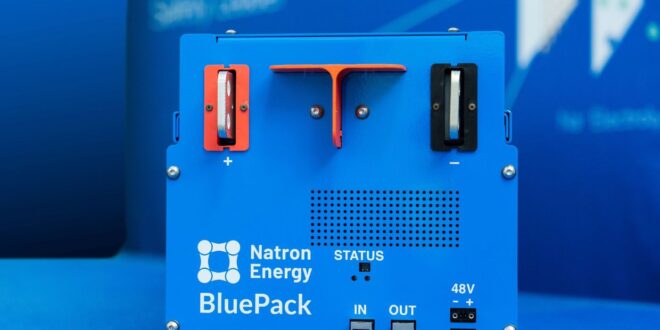The idea of sodium-ion battery production is starting to take off, with the development of models for both industry and electric mobility. This technology is considered both safer and more sustainable than traditional lithium-ion batteries.
In the United States, a startup called Natron Energy is embarking on the large-scale production of sodium-ion batteries, opening its first dedicated factory in Holland, Michigan. Natron Energy announces a production capacity of 600 megawatts of sodium-ion batteries per year, for the time being, exclusively for data centers dedicated to the development of artificial intelligence. Beyond these data centers, Natron Energy’s ultimate target is industry as a whole, as well as the electric mobility sector.
These sodium-ion batteries are both more powerful and faster to charge than traditional lithium-ion batteries. What’s more, they are non-flammable and can withstand up to 50,000 recharge cycles, five to ten times more than lithium-ion batteries.
These batteries contain no lithium, cobalt, copper or nickel. Instead, they include materials such as aluminum, iron, manganese and a sodium electrolyte. Sodium is a much more abundant element that is less complicated to extract and less expensive than lithium. Generally speaking, the production of these sodium-ion batteries requires fewer chemicals that are harmful to nature.
The only drawback for the moment is that these models are a little heavier and bulkier than lithium-ion batteries for the same usage time. As for supply, this is still virtually non-existent, which is why it’s important to get factories like the one in Michigan off the ground.
In the automotive sector, China’s JAC (backed by the Chinese government and the Volkswagen Group) unveiled the Yiwei EV at the start of the year, the world’s very first electric car equipped with a HiNa sodium-ion battery. Battery manufacturing company CATL has also invested in research into this type of battery.
In France, Tiamat, a specialist in sodium-ion batteries, counts automaker Stellantis among its investors. Indeed, it seems that sodium-ion batteries could represent a credible alternative to lithium models in the not-too-distant future. – AFP Relaxnews
 BeritaKini.biz Berita Viral Terkini di Malaysia
BeritaKini.biz Berita Viral Terkini di Malaysia





